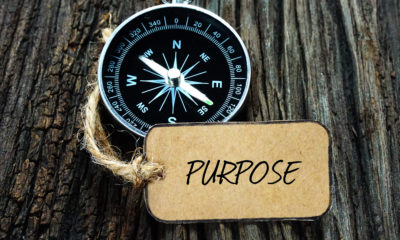7 Signs Your Goals Are Too Small
Are the goals for your life too small?
Consider this quote:
“Life should not be a journey to the grave with the intention of arriving safely in a pretty and well preserved body, but rather to skid in broadside in a cloud of smoke, thoroughly used up, totally worn out, and loudly proclaiming “Wow! What a Ride!” – Hunter S. Thompson
You already know you have one life to live, but a thick veil of denial keeps you from walking around terrified of dying every moment of every day.
For the most part, this is good.
Without it, we would probably hide shaking under our beds, afraid to come out – except we would spend our time calculating the chances of dying in a bed-collapse accident.
But the denial has a downside too.
It allows us to drone through our lives only barely aware that we need to do something about living large.
Someday, the option of that experience is going to be gone.
So how do you know if you have massive denial that is preventing you from living your life like the wild ride it’s meant to be?
You need to examine your goals.
It’s not about being a daredevil or never settling down.
Rather, it’s about consistently doing things that put you on the edge of your comfort zone and push you towards what you want in your life.
And that means setting monumental goals for yourself.
Here are 7 ways to measure your goals:
1. Your goals don’t scare you.
As I said, it isn’t about being a dare devil – not everyone is interested in base jumping – but it is about striving for things that push you.
Being pushed to something bigger in your life usually is scary for most people.
It brings up fears of failure, fears around success, and fears around change.
Those fears are normal, but falling victim to them keeps you stuck right where you are in your life.
Fear is at the root of living our lives small, but when you can tackle your fear you can live like you truly want to live.
Consciously work to understand and overcome your fears so that you can set and achieve your big goals.
2. Your goals don’t feel creative.
If your goals don’t feel creative, they’re probably too small.
Why?
Because uncreative goals mean you’re attempting to achieve the same thing everyone else is.
You probably haven’t pushed yourself that hard to really think about what you want to do.
In short, you’re being a follower.
You don’t have to be a trendsetter in everything you do.
In fact, you don’t have to be a trendsetter at all.
You really just have to be sure that the goals you are setting for yourself are truly yours, and not just plopped on you by those you happen to be closest to.
Although we are inevitably products of our surroundings to some degree, if you can be true to yourself, you’ll find that at least some of your goals feel unique and creative – not cookie-cutter versions of the goals of everyone around you.
3. You can easily imagine how you’re going to achieve them.
Big goals are big.
Like tall-tree big.
Like mountain big.
This means that standing at the bottom of a big goal, it’s really hard to see the top.
If you can already see the entirety of your goal, it’s not big enough.
It is important to have goals of all sizes, but if your big ones are not super-sized, it’s time to change your order.
When a goal makes you think, “How the heck am I going to do that?”
that’s when you know you’re on track.
It’s important to stay in the sweet spot, though.
If you choose something that feels so impossible that you either can’t believe you could possibly achieve it or aren’t sure if you’d want it if it happened, you might be out of the realm of goal-setting and into fantasy.
So for example, you might have a big goal of becoming a best-selling author.
Awesome!
It would take some work to actually figure out how to make that happen and to pull it off.
Perfect big goal.
But you start venturing into fantasy-land when you decide your goal isn’t big enough until you set out to become the best-selling author of all time – within six months.
So make sure your goal is one that is big enough, but not too big.
4. You can achieve them by yourself.
Big goals aren’t things that happen without help.
Everyone who accomplished something great did it with help, and you won’t be any different.
Help comes in many forms.
It might mean you need someone to babysit while you go to school or you need someone to bounce your business ideas off.
No matter what, the greatest people – from artists to entrepreneurs, writers to inventors – all had people they relied on and worked with to achieve their goals.
So remember, if your goal is something you can do alone, it’s probably not big enough.
5. You end up being the same person at the end.
If there’s one thing that can be said about achieving a big goal, it’s that it changes you.
You not only have your accomplishment to be proud of, but you also realize you’ve tackled your fears – or come face-to-face with your fear of success.
Your new reality gives you a new set of challenges to contend with and it also pushes you to set new big goals for yourself.
In the end, you’re fundamentally changed for the better, because you have more confidence, more self-knowledge, and more wisdom.
6. No one tells you you’re crazy.
What’s the one thing that happens when you set a big goal for yourself?
People tell you that you’re crazy.
They don’t always come right out and say it, but they’ll say things like, “Are you sure you want to do this?”
or “I know a nice little. . . (insert tamer option here)”
Usually, they’re doing it out of protection.
They love you and don’t want to see you get hurt or fail.
But when it happens, you can be sure one of two things has happened:
- You have decided on something crazy.
- Or two, You’ve got yourself an extremely big goal.
If no one is saying you’re crazy, it could be that everyone in your life is extremely open-minded and willing to embrace life, or your goal isn’t big enough.
Which is it for you?
7. You don’t wrestle with yourself about quitting every day.
When you’re working on a big goal, you think about quitting.
A lot.
YOU think you’re crazy (see number 6).
You wonder if it’s worth it, if you are ever going to make it, if you’re just deluding yourself, if you’re being a fool.
But if your goal is small, you don’t do any of those things.
You might just give up out of boredom, out of forgetting your goal ever existed or because you got distracted with something else.
A small goal won’t make you question whether your brother was serious when he told you you were dropped on your head as a child.
Big goals make you wonder if there’s something wrong with you because they’re so hard to achieve.
You constantly contemplate quitting – but you don’t, because you’re so passionate about your big goal that the thought of not making it makes you kind of sick.
If your goal is smaller than that, it’s not big enough.
Don’t Set Only Small Goals
Setting big goals can seem scary and they can take a long time to achieve, but the big goals are what really push you to become a force in your own life.
Keeping your goals small keeps you small as well.
Instead, set your sights just a bit higher than you think you should, and go for it!
Now tell me, what are your big goals?
I’d really love to hear what you’re working on in the comments below!











